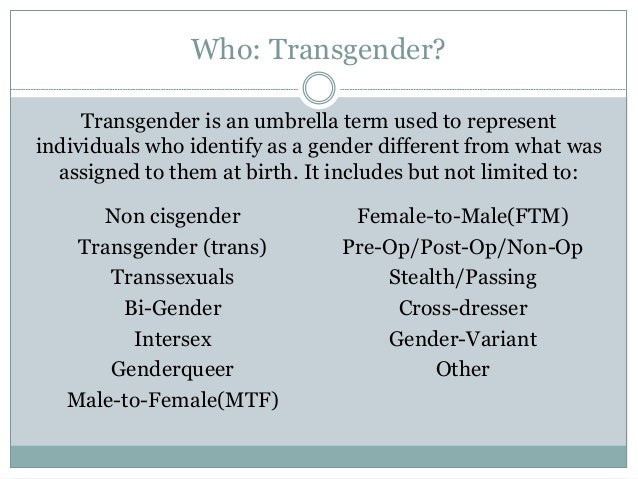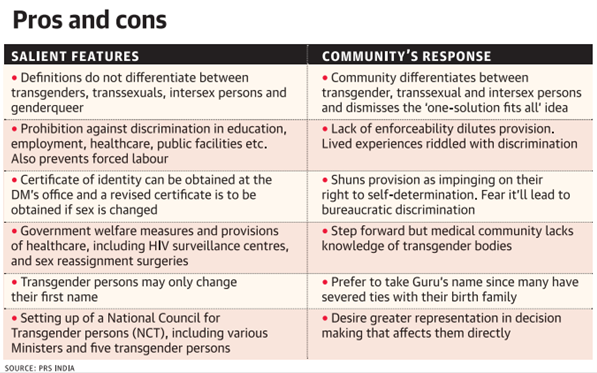Transgender amidst COVID-19
Relevance: Sociology: Social classes in India: Issues of minorities: Poverty,deprivation and inequality: Challenges in Social transformation & G.S paper I: Society and social issues; Vulnerable sections in the society & G.S paper II: Welfare of the vulnerable sections & Minority groups.

CONTEXT
The trans community in India sprang into action when more than 100 LGBTQ and LGBTQ-supportive organisations in the United States released a joint open letter on March 11 to healthcare providers and media outlets urging them to be aware that the LGBTQ community may be at greater risk of contracting the virus than the general public.
Analysis
India’s coronavirus lockdown leaves transgender people at heightened risk of poverty and ill health because they exist on the margins of society, eking out a living through sex work and begging, activists and community members said.
India’s estimated 2 million trans people would be among those worst hit by the move because many make their living on the streets. “They do not have the social privilege of operating within a distant ‘online’ world when their lives are precariously balanced on the thread of social interaction and functions.
Supreme Court of India ruled in 2014 that transgender people had equal rights, but prejudice against them persists and they are often rejected by their families and denied jobs, education and healthcare.
The number of reported cases in India is still under 200, but it won’t be long until the most vulnerable working classes— for whom social distancing is a pipe dream — is waylaid in the absence of “affirmative action.”
The most exposed of these groups is transgenders, who depend on begging, sex work and ritual functions for their daily sustenance — all of which are met through social contact.
Even though the central government, political and religious leaders made efforts to accommodate trans women in Prayagraj’s Kumbh Mela last year before the general elections, they have now chosen to relegate them to the margins.
None of the quarantine centres across India are ready to accommodate transgendersin separate isolation wards, should the virus permeate the community. If anyone contracts the virus, they will be compelled to stay in the male or female wards, where discriminatory treatment is a high possibility.
In this haze of confusion, a trans leader from Calcutta petitioned the WHO, central and state governments recently to initiate separate isolation wards for suspected Coronavirus patients from the LGBTQ community. But she’s still waiting to get a response that could alleviate some of their panic and distress.
The increased vulnerability of sexual minorities is due to the higher use of tobacco than the general population and the higher rates of HIV and cancer due to their compromised immune systems. Besides, they continue to experience discrimination and hostile attitudes from providers and staff in many healthcare settings, making them reluctant to seek medical treatment.
As the transgender people often face social ostracisation, gender-affirmative healthcare is more than surgical and biomedical procedures and involves long-term support and social acceptance.
A 2016 Lancet paper on health of transgenders in India and Pakistan pointed out that while the sexual minority may have received legal recognition, their access to healthcare is abysmally low. Besides, there are hardly any anti-discrimination laws in place to safeguard equality in healthcare access.
The Transgender Persons (Protection of Rights) Bill, signed into law by the President in December 2019, has met with severe criticism from the community.
They feel some of its provisions are unconstitutional, including the third sex’s inability to self-identify their gender without undergoing sex reassignment surgery.
The Act clearly prohibits denial or discontinuation of or unfair treatment of transgenders in healthcare services, yet they’ve been completely forgotten in this extraordinary time of crisis when equal access to healthcare would not only empower them but also charge their community spirit.
The transgenders are one segment of India’s large informal sector whose livelihood is entirely dependent on daily wages and gig jobs. For daily wage labourers, street vendors and domestic help, staying off work means no food on their tables for days and social distancing an impossible dream.
The same, and particularly dangerous threat, looms over hundreds of millions packed into India’s massive slums, where maintaining hygiene is difficult and people have to leave their homes daily for work to survive.
The partial lockdown in India reeks of a class and caste bias as socially, economically and sexually disadvantaged groups have been left vulnerable and exposed. As they go about working for other people, not only are they left more susceptible to the virus but also face the possibility of being denied basic healthcare that the urban elite and middle classes will scramble to scoop up.
Religious leaders across communities should be mindful of this.
While dishing out indigenous and homegrown remedies to save the world from Corona, they could well churn out an empathy potion for the written-off. They may need that even if concrete and targeted government policies along with community backing are imperative.
TRANSGENDER PERSONS (PROTECTION OF RIGHTS) BILL 2019

For more such notes, Articles, News & Views Join our Telegram Channel.
Click the link below to see the details about the UPSC –Civils courses offered by Triumph IAS. https://triumphias.com/pages-all-courses.php

